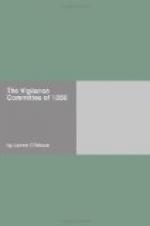It ended with Commodore Farragut’s thrilling
words. In a week or more Hopkins was considered
past danger from his wound, and Judge Terry was thereupon
set free. The Committee had now accomplished about
all that had been contemplated at its organization.
It had put to death four men. Of these at least
two were not guilty of murder, as the law defines that
crime. As to the other two, the course of justice
in the Courts at that time gave no warrant for the
presumption or belief that a fair and just trial would
not have, been given them; that their conviction and
the death penalty would not have followed. It
is not too much to assert that, so far as escape from
the penalty of murder is involved, there has been,
any time these ten years, and there is now, in San
Francisco, stronger cause for a Vigilance Committee
than there was in 1856. The administration of
the law was better then in general criminal procedure
than it is now. There were fewer heinous crimes
then, in the ratio of population, then the record
of any year for the past ten years will show.
In the category of crimes, such as forgery, perjury,
embezzlement, frauds by which large sums of money
or valuable property is obtained, were then infrequent;
now of daily occurrence. But in crimes of violence
the record is enormously against this period in comparison
with that; the infliction of penalties by the Courts
was then more certain than it is now. And as
to ballot-box stuffing and frauds in elections, surely
the worst ever charged against the manipulators of
that period, pales and sinks into insignificance when
compared with the colossal fraud committed in San
Francisco, in 1876, by which not only the will of the
people of the State was overborne, but also the will
of the people of the United States. Yet the perpetrators
of the unparalleled fraud have never been called to
account or punished; to the contrary they are recognized
as gentlemen of respectability, even by those who,
in 1856, forcibly and lawlessly, as Vigilance Committee
members, banishement for stuffing ballot-boxes to
secure merely a local advantage by the success of
a ward ticket. Straining at a gnat and swallowing
a camel never had more conspicuous illustration.
And the burning fact remains incredible that among
the members of the Executive Committee were some who
had themselves obtained office by bribery and corruption,
by calling into play the stuffing of ballot-boxes,
and by all the wicked and infamous means which were
at that time practiced. Another member was, as
I have stated before, a felon who had served his time
in the Ohio State Prison; another, still living and
a highly respectable church member who professes holy
horror of fraud, had in early years colluded with his
brother to get possession of valuable wharf property,
of which the brother was agent and care-taker by appointment
of the owner, who had returned to his home in the
East, to be gone a year. The scheme of these
brothers was a fraud of villainous conception, but




